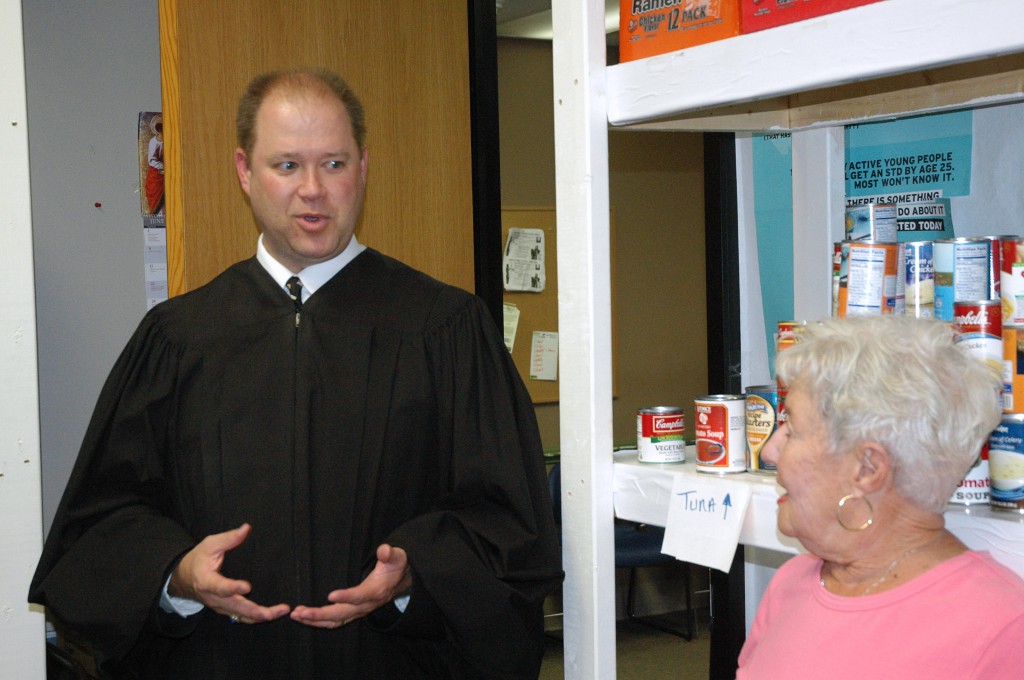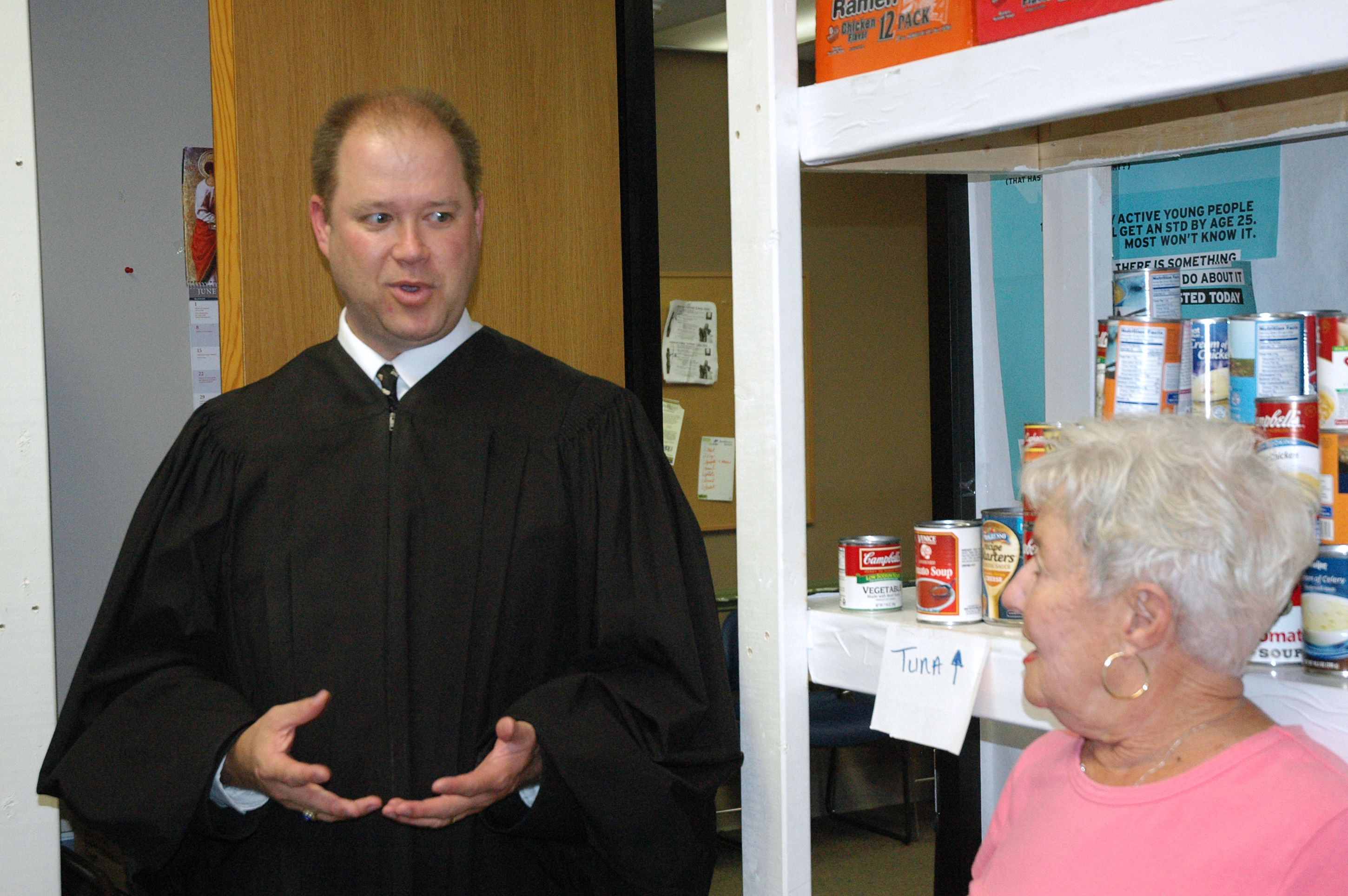
INDIANAPOLIS (CNS) — A courtroom isn’t a place that most people associate with compassion, second chances and a judge who is described as “walking the beatitudes.”
Yet spend some time in Indianapolis Community Court, talk with Judge David Certo and the stories start to flow about the steadfast hope and remarkable sense of human dignity that guide this court — the only one of its kind in Indiana.
The stories sometimes depict how a life has been transformed — like the homeless, jobless man who had been arrested several times for alcohol-related offenses. He grasped the court’s offer of a second chance, performed community service and entered a treatment program. Eventually, he was able to get his own home, and he found a job as a substance abuse counselor.
There also are the stories of mothers helping to feed and clothe their families through the court’s food pantry and donated clothing pantry — assistance that is available both to offenders who come to court and struggling, vulnerable people from across the city.
The court also helps veterans get housing, medical treatment and job training.
It’s all part of a court that believes in helping people strive for a better life, a court that has a strong influence of Catholic faith — including the leadership of former seminarian Certo, the compassion of numerous food pantry volunteers and the service of high school students.
“Our first priority is making our community safer,” said Certo, a member of St. John the Evangelist Parish in Indianapolis. “But how we’re going to get there is a conversation we should have more often. In our line of work, we know life is hard for people. We don’t want to make it any harder.
“Part of what we do is just helping people. The fact that I want to get to heaven fuels what I do, too,” he told The Criterion, newspaper of the Indianapolis Archdiocese. “It’s about all of us treating each other as neighbors.”
During a recent court session, defendants included a well-groomed college student in a blue sports jacket, a young woman who took time off work to be in court, and a weary-looking man who told the judge that his car broke down and he supports his wife and son with a job that pays $10 an hour.
All had committed low-level, nonviolent, nonsexual crimes — many of them shoplifting and alcohol-related charges. And all agreed to plead guilty with the understanding that the charges would be dismissed if they completed some combination of community service, a treatment program and a session about the impact of their crime on the community — and the stipulation that they aren’t arrested again within 60 days.
Officials try to set up court appearances sessions that accommodate a person’s work, school and family schedules.
“My theory is that government can be pretty good about mailing you a check, but not good about asking how you are, how your kids are,” Certo said. “In our classes, we ask them about their goals. We try to help them get jobs. If you complete the program and get a job, we’ll give you a bike to get to work. … Our goal is to try to get them from a bad place to a better place.”
The court also offers free haircuts, bus passes, legal services and testing for sexually-transmitted diseases.
In 2013, 1,561 people entered the community court, with 1,039 finishing the program — for a successful completion rate of 67 percent.
“In our model, the community benefits, too, because you have to do community service,” the judge said.
Offenders clean up abandoned properties, stock shelves at food banks, and pick up trash in alleys and along interstates.
The goal is to keep them from coming back to court, “but if it doesn’t work out, we’re going to hold them accountable,” Certo said.
That can mean jail time. Still, the overall approach is reflected in his decision to convert a conference room into a food pantry, named in honor of Indianapolis police officer David Moore. The 2000 graduate of Roncalli Catholic High School in Indianapolis died Jan. 26, 2011, three days after being shot four times while making a traffic stop.
“This is the face of Jesus right here,” said Mary Anne Schaefer, director of the pantry, referring to about 50 individuals and families who have come on a recent Thursday afternoon.
Schaefer is a pastoral associate at St. Joan of Arc Parish in Indianapolis, yet she’s also part of a group of people from her parish and several others who volunteer at the food pantry when it’s open five times a month.
Teachers, students and parents of Bishop Chatard Catholic High School in Indianapolis also help out regularly.
“In the last three years, we’ve served over 8,000 individuals,” Schaefer said. “We serve the neighborhood at large — people from all denominations, of all ages.”
Schaefer excused herself to help a young mother with two small sons. She smiled at the mom, joked with the children and made sure they walked away with a few grocery bags that included meat, vegetables, cereal, potatoes, bread and desserts.
“On my off days and free days, this is my passion,” she said, returning to her conversation with a reporter. “How do you walk away from Jesus? This is the walk. This is the journey. You have the opportunity to humble yourself for the people who are here. We see Jesus every time we’re here.”
Certo, a father of four, said he sees the court’s approach as a team effort.
As he walked from his office to the courtroom, Certo passed under a sign that reads, “Judge Like A Champion Today.”
A gift from his wife, Megan, the sign reflects his connection with the University of Notre Dame and the longtime theme of the school’s football team, “Play Like A Champion Today.” A 1993 graduate, Certo said Notre Dame’s emphasis on making a difference in the world is one of the approaches that guide him.
“I have the great privilege of integrating my work with the things I believe in,” he said. “My dad died young. That taught me a lot about living. If I get hit by a bus, I don’t want to make apologies.
“You can treat people with dignity and respect. I think you get better outcomes with that approach. Ultimately, we all want a safer, more humane society. Even when people struggle, I know we can get there.”
— By John Shaughnessy, Catholic News Service. Shaughnessy is on the staff of The Criterion, newspaper of the Indianapolis Archdiocese.







